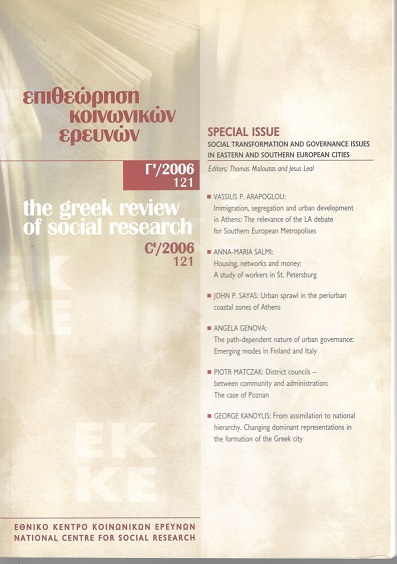Housing, networks and money: A study of workers in St. Petersburg
Abstract
This article examines housing in the Soviet and post-Soviet era drawing from interview material with fifty factory workers in St. Petersburg studied in 2000. While the Soviet era is often characterised by lack of choice, I argue that people were in fact able to influence their housing much more than is usually considered, although the choices available were certainly limited and action was tactical rather than strategic by nature (to borrow Michel de Certeau’s concepts). I argue that money was far more important than is usually acknowledged, and many respondents emphasised that they earned decent money and were able to purchase housing in the Soviet era. Networks played a role too, for instance in attempts to influence the authorities in charge of housing or to manipulate the rules of allocation. I also show that various steps in the Soviet family’s life course (e.g. marrying or having a child) were important in order to obtain housing. The post-Soviet era, in contrast, is characterised by lack of money and few opportunities to improve housing. For many respondents, then, it is the Soviet era that looks as an era that made action possible, whereas the opportunities to act have now been severely reduced. This, and not just pure nostalgia, explains why most respondents long for the Soviet times.
Article Details
- How to Cite
-
Salmi, A.-M. (2016). Housing, networks and money: A study of workers in St. Petersburg. The Greek Review of Social Research, 121, 39–70. https://doi.org/10.12681/grsr.9568
- Section
- Articles

This work is licensed under a Creative Commons Attribution-NonCommercial 4.0 International License.
Authors who publish with this journal agree to the following terms:
- Authors retain copyright and grant the journal right of first publication with the work simultaneously licensed under a Creative Commons Attribution Non-Commercial License that allows others to share the work with an acknowledgement of the work's authorship and initial publication in this journal.
- Authors are able to enter into separate, additional contractual arrangements for the non-exclusive distribution of the journal's published version of the work (e.g. post it to an institutional repository or publish it in a book), with an acknowledgement of its initial publication in this journal.
- Authors are permitted and encouraged to post their work online (preferably in institutional repositories or on their website) prior to and during the submission process, as it can lead to productive exchanges, as well as earlier and greater citation of published work (See The Effect of Open Access).



